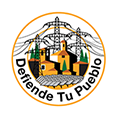How Do We Defend Our Community?
We are not against solar energy. And it’s sad that we actually have to fight against these mega solar ‘farms’.
But, it turns out that a company like Renovalia is not in the solar business to make this place a better world. Its main reason for constructing mega solar ‘farms’ is to make money.
As is clear from their proposals, Renovalia has no problem with cutting down millions of trees, destroying wildlife habitats and agricultural land, living spaces and tourist walking routes, to make way for a desert of solar panels.
Renovalia is a company based on disaster capitalism. It uses the global climate crisis as a justification and an opportunity to make money. It does not seek to solve the problem, but rather, to monetize the problem to its own benefit.
- Cutting down trees does not help the climate crisis
- Destroying farmland does not help the local economy or the climate crisis
- Destroying bird habitats does not help biodiversity in an age of mass extinction
- Solar farms will not give work to the local economy as they will be automated.
The electricity generated by Renovalia’s solar farms will not benefit local communities. It will be sold to the national grid and probably exported to northern Europe. The aim is to fill the wallets of the hedge funds who have invested and who speculate with renewable energy initiatives. This is not a sustainable economic system. Sadly this scenario is being played out in many places throughout Spain and wider afield.
So, What Would We Fight For?
The technology of solar energy is amazing and has great potential. We pose this question: Why can’t solar panels be constructed on appropriate rooftops and on degraded land spaces as a matter of generalised policy?
We support the following general approaches to the provision of community energy:
- A significant increase in support of solar panels on rooftops. Not only on houses but also on industrial buildings, parking lots, disused mines and excavated land.
- Increased support and protection for farmland (secano and regadío)
- Building of better local energy networks.
- Promoting local agricultural products.
- Preserving local animal and plant habitats.
- Supporting people to live in the countryside.
We now have a unique opportunity to democratize energy by allowing people to generate their own renewable energy. Do we let history repeat itself by allowing companies like Renovalia to zoom in and take control of our resources and political decisions (as did Shell, BP and Standard Oil with fossil fuels in the earlier 20th century)? Or do we help create energy independence and equitable distribution by encouraging solar panels on rooftops, and supporting locally-owned energy co-operatives and solar installations?
